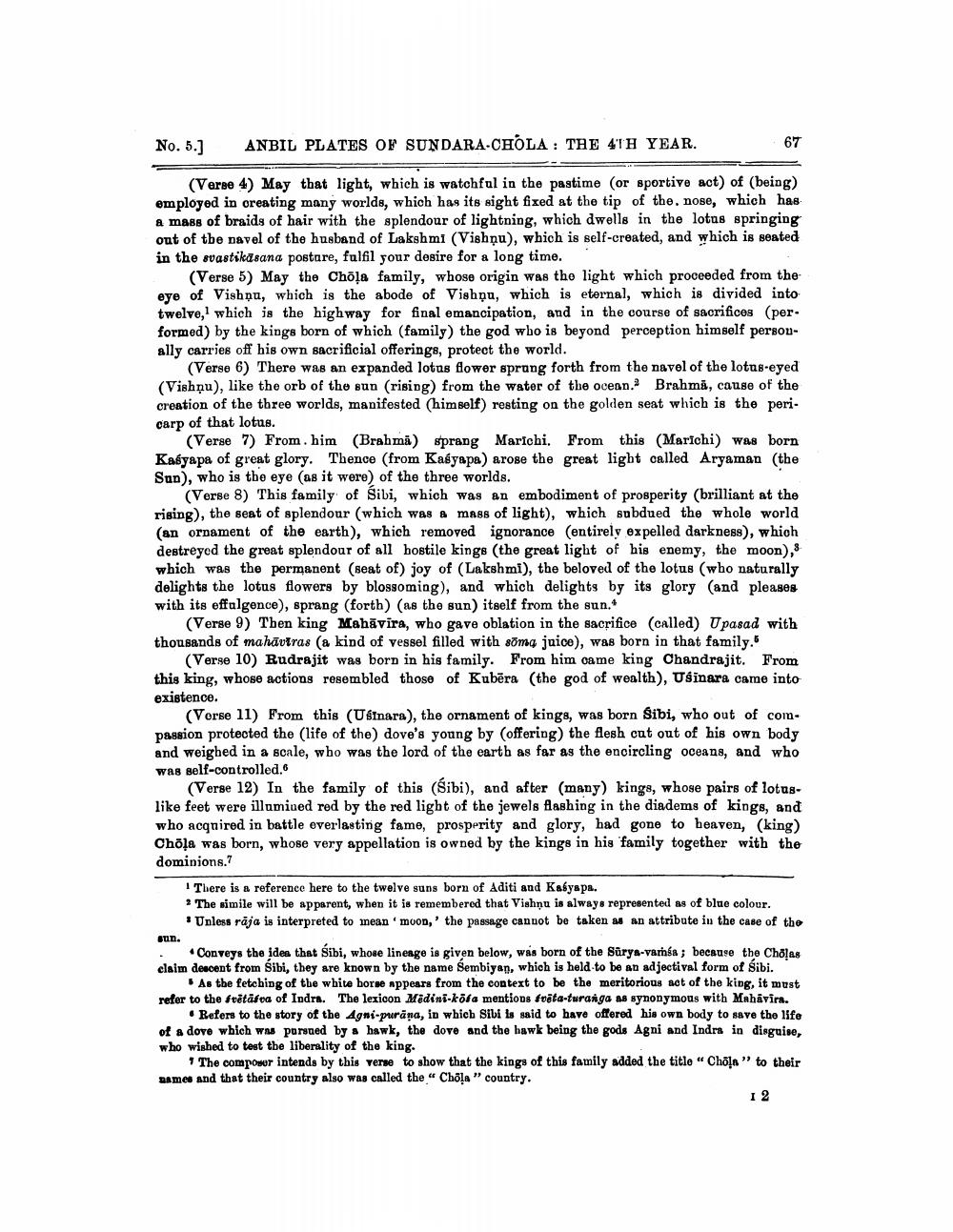________________
No. 5.]
ANBIL PLATES OF SUNDARA-CHOLA: THE 4TH YEAR.
(Verse 4) May that light, which is watchful in the pastime (or sportive act) of (being) employed in creating many worlds, which has its sight fixed at the tip of the. nose, which has a mass of braids of hair with the splendour of lightning, which dwells in the lotus springing out of the navel of the husband of Lakshmi (Vishnu), which is self-created, and which is seated in the svastikasana postare, fulfil your desire for a long time.
(Verse 5) May the Chōla family, whose origin was the light which proceeded from the eye of Vishnu, which is the abode of Vishnu, which is eternal, which is divided into twelve, which is the highway for final emancipation, and in the course of sacrifices (performed) by the kings born of which (family) the god who is beyond perception himself personally carries off his own sacrificial offerings, protect the world.
(Verse 6) There was an expanded lotus flower sprung forth from the navel of the lotus-eyed (Vishnu), like the orb of the sun (rising) from the water of the ocean. Brahma, cause of the creation of the three worlds, manifested (himself) resting on the golden seat which is the pericarp of that lotus.
67
(Verse 7) From. him (Brahma) sprang Marichi. From this (Marichi) was born Kasyapa of great glory. Thence (from Kasyapa) arose the great light called Aryaman (the Sun), who is the eye (as it were) of the three worlds.
(Verse 8) This family of Sibi, which was an embodiment of prosperity (brilliant at the rising), the seat of splendour (which was a mass of light), which subdued the whole world (an ornament of the earth), which removed ignorance (entirely expelled darkness), which destreyed the great splendour of all hostile kings (the great light of his enemy, the moon),3 which was the permanent (seat of) joy of (Lakshmi), the beloved of the lotus (who naturally delights the lotus flowers by blossoming), and which delights by its glory (and pleases with its effulgence), sprang (forth) (as the sun) itself from the sun.*
(Verse 9) Then king Mahavira, who gave oblation in the sacrifice (called) Upasad with thousands of mahaviras (a kind of vessel filled with soma juice), was born in that family."
(Verse 10) Rudrajit was born in his family. From him came king Chandrajit. From this king, whose actions resembled those of Kubera (the god of wealth), Usinara came into existence.
(Verse 11) From this (Usinara), the ornament of kings, was born Ŝibi, who out of compassion protected the (life of the) dove's young by (offering) the flesh cut out of his own body and weighed in a scale, who was the lord of the earth as far as the encircling oceans, and who was self-controlled."
(Verse 12) In the family of this (Sibi), and after (many) kings, whose pairs of lotuslike feet were illumiued red by the red light of the jewels flashing in the diadems of kings, and who acquired in battle everlasting fame, prosperity and glory, had gone to heaven, (king) Chōla was born, whose very appellation is owned by the kings in his family together with the dominions.7
sun.
1 There is a reference here to the twelve suns born of Aditi and Kasyapa.
2 The simile will be apparent, when it is remembered that Vishnu is always represented as of blue colour.
* Unless rāja is interpreted to mean moon,' the passage cannot be taken as an attribute in the case of the
Conveys the idea that Sibi, whose lineage is given below, was born of the Surya-vamsa; because the Cholas claim descent from Sibi, they are known by the name Sembiyan, which is held to be an adjectival form of Sibi.
As the fetching of the white horse appears from the context to be the meritorious act of the king, it must refer to the svētāsva of Indra. The lexicon Medini-kōta mentions sveta-turanga as synonymous with Mahavira. Refers to the story of the Agni-purana, in which Sibi is said to have offered his own body to save the life of a dove which was pursued by a hawk, the dove and the hawk being the gods Agni and Indra in disguise, who wished to test the liberality of the king.
The composer intends by this verse to show that the kings of this family added the title "Chōla" to their names and that their country also was called the " Chōla" country.
1 2




